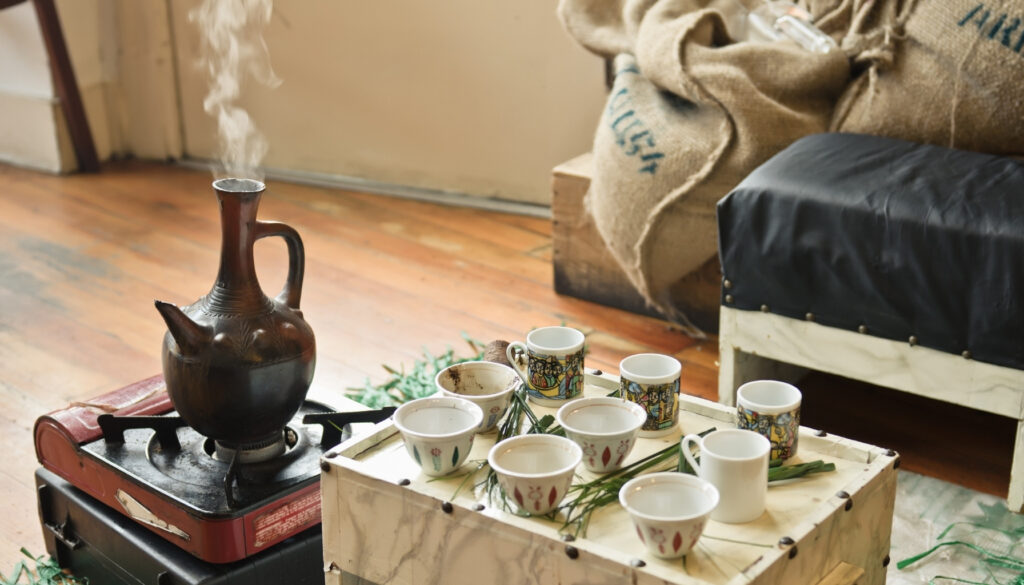Coffee, one of the most cherished beverages worldwide, transcends mere consumption; it embodies culture, tradition, and community. Across various regions, unique coffee ceremonies have emerged, each reflecting the rich heritage of the people who partake in them. From the intricate brewing methods in Ethiopia to the leisurely café rituals of Italy, coffee ceremonies serve as a testament to the art of brewing and the joy of sharing. Join us as we explore the sacred world of traditional coffee ceremonies and uncover the stories and significance behind each ritual.
1. Coffee’s Historical Roots
The journey of coffee began centuries ago, shrouded in legends and myths. Originating in Ethiopia, coffee was discovered by a goat herder named Kaldi, who noticed his goats dancing after eating the cherries from a specific tree. This source of energy led to the cultivation and trade of coffee, which spread rapidly across the Arabian Peninsula. By the 15th century, coffee had made its way to Persia, Egypt, and Turkey, causing the establishment of the first coffee houses known as qahveh khaneh.
These early coffee houses became centers for social interaction, political debates, and artistic expression. They played a crucial role in the cultural tapestry of the time, where patrons gathered not only to enjoy the beverage but also to engage in enlightening conversations. As coffee reached Europe in the 17th century, it transformed into a symbol of sophistication and refinement, embodying the same communal spirit that characterized its beginnings.
2. The Ethiopian Coffee Ceremony
Among the most revered coffee ceremonies is the Ethiopian tradition, celebrated for its intricate steps and emphasis on hospitality. In Ethiopia, coffee is more than a drink; it is a ritual that unites families and communities. The ceremony begins with the roasting of green coffee beans over an open flame, filling the air with a rich, aromatic scent. The host often invites guests to witness this process, heightening the sense of involvement.
Once the beans roast to a deep brown, they are ground using a mortar and pestle. This act serves as a reminder of the effort involved in preparing the sacred brew. Following this, water is boiled in a traditional vessel called a jebena. The freshly ground coffee is then added, and the mixture simmers before being poured into small cups. Guests enjoy two or three rounds of coffee, each signifying respect and friendship. The Ethiopian ceremony stands as a beautiful embodiment of cultural pride and community bonding.
3. Turkish Coffee Rituals
Transitioning to Turkey, the country boasts its unique coffee brewing method, often associated with luxurious flavors and elaborate rituals. Turkish coffee, known as Türk kahvesi, is distinguished by its fine grind, rich taste, and the use of a special pot called a cezve. The preparation of Turkish coffee often involves a series of steps that require precision and patience.
The coffee is combined with water and sugar in the cezve, and the mixture is heated slowly. As the coffee begins to foam, the host must carefully monitor it to prevent overflowing—a skill that has been passed down through generations. Once ready, the rich brew is poured directly into small cups, grounds included. This tradition is not merely about drinking coffee; it serves as a gateway into Turkish hospitality, where sharing coffee signifies a bond between friends and family.
4. Arabic Coffee: The Art of Gahwa
In the Arabian Peninsula, particularly in countries like Saudi Arabia and the United Arab Emirates, coffee ceremonies revolve around Arabic coffee, or gahwa. This light, cardamom-infused coffee is typically served in small cups without sugar, emphasizing its unique flavor. The preparation is a meticulous process, showcasing the significance of hospitality in Arab culture.
During a gahwa ceremony, the host begins by roasting green coffee beans and grinding them finely. The coffee is then brewed in a special pot called a dallah, where the infusion of cardamom enhances its aroma. Guests receive the coffee in small cups, often accompanied by dates. The ritual embodies generosity, as pouring coffee for guests demonstrates respect and care. Rejecting coffee may be seen as impolite, thus reinforcing the idea of connection and community in the process.
5. The Italian Espresso Experience
Italy’s contribution to the coffee world cannot be overstated, with its rich espresso culture that emphasizes speed and intensity. In Italy, coffee serves as a daily ritual, particularly in the form of espresso, which plays a central role in social interactions. Italian coffee ceremonies are less formal than their Middle Eastern counterparts, focusing instead on efficiency and enjoyment.
In a bustling café, patrons gather to savor the strong, bold flavors of espresso, often standing at the bar for a quick shot. Italians typically consume their coffee quickly, reflecting the fast-paced lifestyle of many urban environments. However, the experience remains sophisticated, characterized by attention to detail in the brewing process. High-quality beans, precise temperatures, and expert techniques come together to create the perfect espresso, making the Italian coffee experience truly iconic.
6. The French Café Culture
France, particularly Paris, is synonymous with leisurely café experiences. The French café culture invites individuals to soak in the ambiance, indulging in coffee accompanied by pastries or light meals. A visit to a café often becomes a social event, where conversation flows as freely as the coffee itself.
In many Parisian cafés, coffee is often served in a ceramic cup, allowing patrons to appreciate not only the taste but also the aesthetic of the beverage. The act of ordering a café crème or espresso becomes a ritual in itself, elevating the experience. Patrons immerse themselves in the art of people-watching, adding to the allure of the café scene. This rich, leisurely experience underscores the significance of coffee as a means of socialization and enjoyment in France.
7. Japanese Coffee Ceremony: A Fusion of Tradition and Modernity
Japan’s approach to coffee combines traditional tea ceremony principles with modern brewing techniques, resulting in a unique experience known as Kōfū. Emphasizing simplicity and mindfulness, the Japanese coffee ceremony focuses on the aesthetics of preparation and taste. The process often involves a Hario drip system or siphon coffee maker, showcasing the artistry behind each cup.
During the Japanese coffee ceremony, the host carefully selects high-quality beans, often sourced from specialty roasters. The brewing method focuses on precision, where water temperature and extraction time play pivotal roles. This meticulous approach signifies respect for the coffee and enhances the sensory experience. As guests savor each sip, they engage in contemplation, making the Japanese coffee ceremony a harmonious blend of flavors and mindfulness.
8. The Colombian Coffee Experience
Colombia, renowned for its exceptional beans, offers a distinctive coffee ceremony deeply tied to its cultural identity. The country prides itself on producing some of the finest coffee globally, and locals often celebrate this heritage through communal gatherings centered around coffee. The Colombian coffee experience emphasizes the importance of local farming communities and sustainable practices.
During a traditional Colombian coffee ceremony, the host may invite guests to participate in the brewing process, usually making use of a traditional steeping method called chuela. This involves using a cloth filter to brew coffee, allowing for a rich flavor while showcasing the authenticity of the beans. Drinking coffee in Colombia is an act of connection, where families and friends come together to share stories and experiences, reinforcing the idea that coffee transcends mere consumption.
9. The Mexican Café de Olla
In Mexico, coffee takes on a unique form with the traditional brew known as café de olla. This rustic preparation method involves brewing coffee with spices such as cinnamon and piloncillo (a type of unrefined cane sugar), resulting in a delightful infusion of flavors. This traditional beverage is often tied to familial gatherings and celebrations, highlighting its significance in Mexican culture.
The brewing process often occurs in a clay pot, or olla, which not only imparts a distinct flavor but also reflects the rich craftsmanship of Mexican artisans. As families gather around this comforting brew, stories and laughter fill the air, reinforcing the bonds that coffee fosters. Café de olla represents warmth and hospitality, showcasing the essence of Mexican culture and its celebration of togetherness.
10. The Chinese Tea and Coffee Fusion
In China, tea has long held the throne as the beverage of choice; however, in recent years, coffee has begun to carve its niche. The rise of coffee culture in urban centers has led to the emergence of unique coffee ceremonies that blend traditional practices with modern twists. Coffee shops in cities like Shanghai and Beijing have adopted innovative brewing methods, often incorporating elements of tea ceremonies.
One popular fusion is the pairing of coffee with traditional Chinese herbs or teas. This creative approach allows for a unique culinary experience, showcasing the versatility of coffee. In cafés, baristas often share the origins of the beans, taking patrons on a sensory journey that celebrates the art of brewing. The Chinese coffee ceremony invites curiosity, allowing coffee lovers to explore new flavors and cultural intersections.
11. The Brazilian Coffee Ritual
Brazil, one of the largest coffee producers in the world, boasts a lively coffee culture that reflects its vibrant spirit. The Brazilian coffee ritual often revolves around cafezinho, a small, strong coffee served sweetened, showcasing the hospitality of the nation. This quick yet flavorful brew plays an integral role in social interactions, symbolizing friendship and warmth.
During gatherings, guests enjoy cafezinho while engaging in heartfelt conversations. The preparation is simple yet effective, as finely ground coffee is boiled in water before being served in small cups. The ritual of sharing cafezinho is a cherished tradition, demonstrating the connections that coffee helps forge in Brazilian society. The experience encapsulates the essence of Brazilian culture—warm, inviting, and full of life.
12. The Peruvian Coffee Connection
Moving to Peru, the country’s diverse coffee offerings reflect its rich agricultural heritage. Peruvian coffee ceremonies emphasize sustainability and community, frequently involving small family farms. The ritual typically centers around the brewing of freshly roasted coffee beans, often prepared using a simple method reminiscent of the Colombian tradition.
During a Peruvian coffee ceremony, guests often partake in cupping sessions to appreciate the distinct flavors and aromas of various beans. This interactive experience fosters appreciation for the art of coffee-making while encouraging deeper connections among participants. As coffee flows, stories of local farms and traditions emerge, creating a sense of unity and shared appreciation among those gathered.
13. The Indian Chai and Coffee Fusion
In India, the beverage landscape is dominated by chai, yet coffee ceremonies have gained popularity, particularly in southern regions like Karnataka and Kerala. The Indian coffee culture blends traditional chai preparation methods with the rich flavors of coffee, creating a unique fusion. The coffee brewing process often involves using a traditional filter, where brewed coffee seeps through layers of ground coffee.
The resulting brew is rich and aromatic, often served with milk and sugar, offering a delightful contrast to the spiced chai. This fusion exemplifies the versatility of coffee in Indian culture, where it coexists beautifully with diverse flavors. Coffee gatherings become occasions for connection, as friends and family share stories over steaming cups, celebrating both beverages.
14. The Icelandic Coffee Culture
Iceland’s coffee culture reflects the country’s penchant for simplicity and quality. Coffee is deeply ingrained in everyday life, with many Icelanders enjoying a cup while engaging in conversation or reading. Cafés in Reykjavik often serve local roasts that highlight the unique flavors of Nordic coffee, creating an inviting atmosphere for coffee enthusiasts.
Icelandic coffee ceremonies emphasize the enjoyment of high-quality beans, prepared using methods such as pour-over or French press. The act of brewing becomes a communal experience, with friends gathering to savor each cup. This emphasis on quality over quantity aligns with the Icelandic philosophy of valuing connections, making the coffee experience one of warmth and camaraderie.
15. The Australian Café Scene
Australia has cultivated a vibrant café culture that emphasizes specialty coffee and artisanal brewing methods. The Australian coffee ceremony revolves around creating high-quality beverages that showcase skill and craftsmanship. From flat whites to cold brews, the diverse offerings attract coffee lovers from all walks of life.
Australian cafés often focus on sustainability, sourcing beans from ethical farms. The experience transcends mere consumption, as patrons engage in discussions about origins and brewing techniques. Gathering at a café in Australia becomes an opportunity to connect with others while appreciating the nuances of each cup. This spirited approach to coffee reflects the creativity and innovation at the heart of Australian culture.
16. The Scandinavian Coffee Rituals
In Scandinavian countries, coffee culture reflects the region’s emphasis on coziness, or “hygge.” The rituals surrounding coffee often involve inviting friends or family to share a moment over a well-brewed cup. Coffee breaks, known as “kaffepause” in Sweden, are integral to daily life, encouraging relaxation and connection.
Scandinavian coffee ceremonies prioritize quality, often featuring light roasts that highlight the beans’ natural flavors. The brewing process is simple yet intentional, allowing the coffee to shine without overwhelming flavors. As participants sip their coffee, they engage in meaningful conversations, reinforcing the rich sense of community that accompanies each cup. This embodies the essence of “fika.”
17. The South African Coffee Tradition
In South Africa, coffee has gained popularity among diverse communities, leading to the emergence of unique cultural practices surrounding its consumption. Each region contributes its flair, showcasing local flavors and preferences. The growing café culture has transformed traditional coffee rituals, emphasizing innovation and creativity.
South African coffee ceremonies often incorporate Rooibos, a local herbal infusion, enhancing the brewing experience. The process includes brewing coffee alongside spices, creating a rich blend of flavors that reflects the country’s diverse culinary identity. Coffee gatherings become celebrations of heritage and community, fostering a sense of belonging as individuals share their stories over steaming cups.
18. The Influence of Coffee on Art and Literature
Coffee has not only contributed to social interactions but also inspired countless artists and writers throughout history. From coffeehouses in Paris, where existentialist thinkers gathered, to cafés in Vienna that served as intellectual hubs, the synergy between coffee and creativity is undeniable. The ambiance of coffee ceremonies fosters an environment conducive to artistic expression.
Many literary figures have penned their thoughts over cups of coffee, finding inspiration in the warmth and companionship the beverage offers. The coffee ceremony becomes a sacred space where ideas flow freely, echoing the cultural significance of this beloved drink. In essence, coffee has woven itself into the fabric of artistic culture, serving as a constant reminder of the power of connection.
19. The Future of Coffee Ceremonies
As the world becomes more interconnected, the appreciation for traditional coffee ceremonies continues to evolve. Modern influences blend with age-old practices, creating new experiences that pay homage to cultural roots while embracing innovation. Coffee enthusiasts are increasingly curious about the stories behind their brews, sparking a desire for authenticity and connection.
The future of coffee ceremonies lies in reimagining these rituals to foster inclusivity and sustainability. As new generations seek meaningful connections, coffee can serve as a bridge, bringing people together across cultures and borders. The journey forward promises a celebration of diversity, inviting individuals to explore the rich tapestry of global coffee traditions while forging new connections through the sacred brew.
20. Conclusion: A Global Celebration of Coffee
Throughout our exploration of traditional coffee ceremonies, it becomes clear that coffee transcends borders; it unites people across cultures. Each ceremony embodies a unique history, infusing moments with significance and connection. As we indulge in the richness of the world’s coffee traditions, let us appreciate not just the brew but also the stories, the people, and the rituals that elevate coffee from a simple drink to a sacred act of sharing.
In every cup of coffee, there lies a world of cultural heritage waiting to be discovered. Whether you find yourself amidst the aromatic Ethiopian ceremony or enjoying a quick espresso in an Italian café, remember that coffee ceremonies are about more than just the drink; they are a celebration of humanity, a testament to the bonds we forge, and an exploration of the diverse tapestry that makes our world so wonderfully rich. So, raise your cup and embrace the sacred brew that connects us all—one delicious sip at a time.


